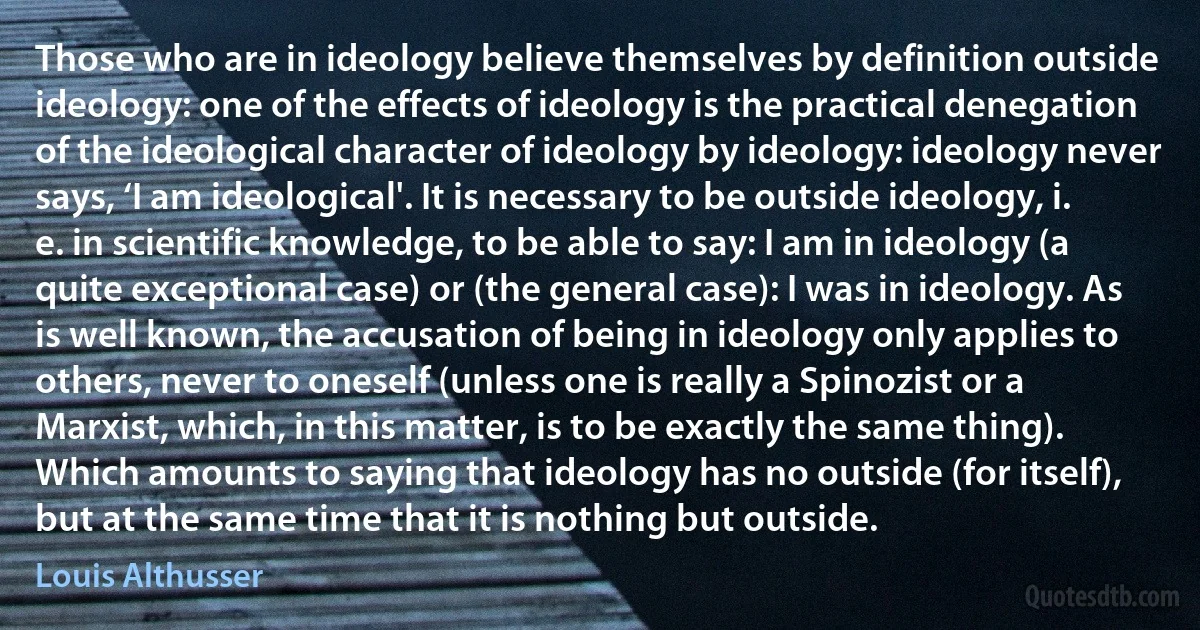Spinozist Quotes
Just as Hegel later developed the metaphysical and rationalistic bases of the Spinoza philosophy giving the only possible refutation to Spinozism, that is, by converting the substance of Spinoza into an absolute idea, into the absolute spirit, and in this way, presented an antithesis to Spinozist teaching, so in his time, Spinoza presented an antithesis with respect to Descartes, but a materialistic antithesis.

Baruch Spinoza
It is clear that the origins of the discourse on multitude are to be found in the subversive interpretation of the thinking of Spinoza. I can never tire of stressing the importance of the Spinozan premise in the treatment of this thematic. And one highly Spinozist theme is that of the body, and particularly that of the potent body.

Baruch Spinoza
As interpolation instead of interpretation was not then so common or so honourable as at present, I believed that a part of my work was well done. How was I to expect that, because I ascribed piety to Spinoza, I would myself be taken for a Spinozist ? Yet I had never defended his system, and anything philosophic that was in my book was manifestly inconsistent with the characteristics of his views and had quite a different basis than the unity of substance.

Baruch Spinoza
Although Baruch Spinoza is one of the great thinkers of the European philosophical tradition, he was not a professional scholar – he earned his modest living as a lens grinder. So, unlike many thinkers of his time, he was unconstrained by allegiance to a church, university or royal court. He was free to be faithful to the pursuit of truth. This gives his philosophy a remarkable originality and intellectual purity – and it also led to controversy and charges of heresy. In the 19th century, and perhaps even more recently, "Spinozist" was still a term of abuse among intellectuals. In a sense, Spinoza was always an outsider – and this independence is precisely what enabled him to see through the confusions, prejudices and superstitions that prevailed in the 17th century, and to gain a fresh and radical perspective on various philosophical and religious issues.

Baruch Spinoza
His [Hegel's] early and decisive break with theism came in correspondence with Schelling and Hölderlin, who were reading Fichte's 1794 Wissenschaftslehre as Spinozism on a Kantian foundation. He later professes his own Spinozism in bold terms. "You are either a Spinozist or not a philosopher at all” and "It is therefore worthy of note that thought must begin by placing itself at the standpoint of Spinozism; to be a follower of Spinoza is the essential commencement of all Philosophy. For as we saw above, when man begins to philosophize, the soul must commence by bathing in this ether of the One Substance in which all that man has held as true has disappeared”.

Baruch Spinoza
...Spinoza was the philosopher who knew full well that immanence was only immanent to itself and therefore that it was a plane traversed by movements of the infinite, filled with intensive ordinates. He is therefore the prince of philosophers. Perhaps he is the only philosopher never to have compromised with transcendence and to have hunted it down everywhere. In the last book of the Ethics he produced the movement of the infinite and gave infinite speeds to thought in the third kind of knowledge. There he attains incredible speeds, with such lightning compressions that one can only speak of music, of tornadoes, of wind and strings. He discovered that freedom exists only within immanence. He fulfilled philosophy because he satisfied its prephilosophical presupposition. [...] Spinoza is the vertigo of immanence from which so many philosophers try in vain to escape. Will we ever be mature enough for a Spinozist inspiration?

Baruch Spinoza

